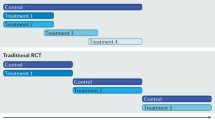Abstract
The concept of “confirmatory” studies is a standard and important component of the overall clinical trials strategy in oncology. However, it is critical that such studies are similar enough in basic design and how they are conducted that they actually have the realistic potential to confirm, or refute, objectively the findings of the original study. In this commentary, two examples of clinical studies in the gynecologic oncology arena suggested by some to serve as “confirmatory” trials for the original reports demonstrate both the dangers and potential inappropriateness of such conclusions.
Similar content being viewed by others
References
Markman M, Liu PY, Wilczynski S, et al. Phase III randomized trial of 12 versus 3 months of maintenance paclitaxel in patients with advanced ovarian cancer after complete response to platinum and paclitaxel-based chemotherapy: a Southwest Oncology Group and Gynecologic Oncology Group trial. J Clin Oncol. 2003;21:2460–5.
Markman M, Liu PY, Moon J, et al. Impact on survival of 12 versus 3 monthly cycles of paclitaxel (175 mg/m2) administered to patients with advanced ovarian cancer who attained a complete response to primary platinum-paclitaxel: follow-up of a Southwest Oncology Group and Gynecologic Oncology Group phase 3 trial. Gynecol Oncol. 2009;114:195–8.
Pecorelli S, Favalli G, Gadducci A, et al. Phase III trial of observation versus six courses of paclitaxel in patients with advanced epithelial ovarian cancer in complete response after six courses of paclitaxel/platinum-based chemotherapy: final results of the After-6 Protocol 1. J Clin Oncol. 2009;27(28):4642–8.
Kita T, Kikuchi Y, Takano M, et al. The effect of single weekly paclitaxel in heavily pretreated patients with recurrent or persistent advanced ovarian cancer. Gynecol Oncol. 2004;92(3):813–8.
Markman M, Blessing J, Rubin SC, et al. Phase II trial of weekly paclitaxel (80 mg/m2) in platinum and paclitaxel-resistant ovarian and primary peritoneal cancers: a Gynecologic Oncology Group study. Gynecol Oncol. 2006;101(3):436–40.
Katsumata N, Yasuda M, Takahashi F, et al. Dose-dense paclitaxel once a week in combination with carboplatin every 3 weeks for advanced ovarian cancer: a phase 3, open-label, randomized controlled trial. Lancet. 2009;374:1331–8.
Katsumata N, Yasuda M, Isonishi S, et al. Long-term results of dose-dense paclitaxel and carboplatin versus conventional paclitaxel and carboplatin for treatment of advanced epithelial ovarian, fallopian tube, or primary peritoneal cancer (JGOG 3016): a randomized, controlled, open-label trial. Lancet Oncol. 2013;14:1020–6.
Pignata S, Scambia G, Lauria R, et al. A randomized multicenter phase III study comparing weekly versus every 3 weeks carboplatin plus paclitaxel in patients with advanced ovarian cancer: Multicenter Italian Trials in Ovarian Cancer (MITO-7)- European Network of Gynaecological Oncological Trial Groups (ENGOT-ov-10) and Gynecologic Cancer Intergroup (GCIG) trial. J Clin Oncol. 2013;31(15 Suppl), LBA5501.
Compliance with Ethics Guidelines
Conflict of Interest
Maurie Markman declares that he has no conflict of interest.
Human and Animal Rights and Informed Consent
This article does not contain any studies with human or animal subjects performed by the author.
Author information
Authors and Affiliations
Corresponding author
Rights and permissions
About this article
Cite this article
Markman, M. Dangers of “Confirmatory” Cancer Trials That Fail To Actually Test the Original Hypothesis. Curr Oncol Rep 16, 381 (2014). https://doi.org/10.1007/s11912-014-0381-5
Published:
DOI: https://doi.org/10.1007/s11912-014-0381-5




